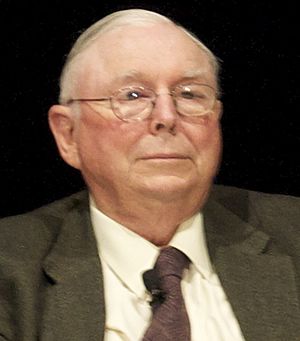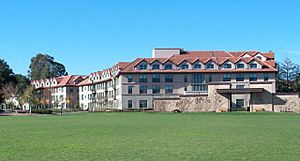Charlie Munger facts for kids
Quick facts for kids
Charlie Munger
|
|
|---|---|

Munger in 2010
|
|
| Born |
Charles Thomas Munger
January 1, 1924 Omaha, Nebraska, U.S.
|
| Died | November 28, 2023 (aged 99) |
| Education | |
| Occupation | Businessman, investor, philanthropist, financial analyst, lawyer |
| Known for | Leading investments at Berkshire Hathaway with Warren Buffett |
| Title | Vice Chairman, Berkshire Hathaway |
| Spouse(s) |
Nancy Jean Huggins
(m. 1945; div. 1953)Nancy Barry Borthwick
(m. 1956; died 2010) |
| Children | 7 |
| Relatives | Thomas Charles Munger (grandfather) |
| Military career | |
| Service/ |
United States Army |
| Years of service | 1943–1946 |
| Rank | Second lieutenant |
| Unit | Army Air Forces |
| Battles/wars | World War II |
| Signature | |
 |
|
Charles Thomas Munger (born January 1, 1924 – died November 28, 2023) was a very successful American businessman and investor. He was also known for his charity work. Munger was the vice chairman of Berkshire Hathaway, a huge company led by his close friend, Warren Buffett. Buffett often called Munger his most trusted partner. Munger also led other companies like Wesco Financial Corporation and the Daily Journal Corporation. He was even on the board of Costco Wholesale Corporation.
Contents
Early Life and Learning
Charlie Munger was born in Omaha, Nebraska. When he was a teenager, he worked at a grocery store owned by Warren Buffett's grandfather. His own father was a lawyer, and his grandfather was a judge.
Munger started studying math at the University of Michigan. In 1943, when he was 19, he left college to join the U.S. Army Air Corps during World War II. He became a second lieutenant. Because he scored very high on a special Army test, he was sent to study meteorology (the science of weather) at Caltech in California.
After the war, Munger wanted to go to Harvard Law School, where his father had studied. Even though he hadn't finished his first college degree, he was accepted after a family friend called the dean. Munger did very well in law school and graduated with a law degree in 1948.
Lessons from Card Playing
During his time in college and the Army, Munger learned an important skill: playing cards. He used this skill to help him in business. He learned that you should "fold early" (give up) when the chances are against you. But if you have a big advantage, you should "back it heavily" (invest a lot) because those chances don't come often. He believed you should seize opportunities when they appear.
Munger also used this idea for investing. He said that treating company shares like baseball cards (just collecting them) is a bad idea. This is because it makes you try to guess what often emotional people will do.
Investing Career
After law school, Munger moved to California and became a real estate lawyer. In 1962, he started his own law firm. But he soon stopped practicing law to focus on managing investments. He partnered with another investor, Otis Booth, in real estate.
Munger met Warren Buffett for lunch, and they started talking about investments. They never stopped. Munger then started an investment firm called Wheeler, Munger, and Company. He closed this firm in 1976 after some tough years.
Munger's Investment Success
Even though he is famous for working with Buffett, Munger ran his own investment partnership from 1962 to 1975. During this time, his investments grew by almost 20% each year. This was much better than the stock market average, which grew by only 5% per year.
Munger used to be the chairman of Wesco Financial Corporation. This company started as a savings and loan business. It grew to own other companies like Precision Steel Corp. and CORT Furniture Leasing. Wesco also owned many shares in big companies like Coca-Cola, Wells Fargo, and Procter & Gamble. Munger believed that owning a small number of stocks that he knew very well would lead to better results over time.
Wesco's yearly meetings were held in Pasadena, California, where Munger lived. These meetings were almost as famous as the ones he had with Buffett. Munger would talk for a long time with shareholders, sometimes even wondering what Benjamin Franklin would do in certain situations.
After the Wesco meetings ended, the annual meeting for the Daily Journal Corporation became very popular. Investors would come from everywhere to hear Munger speak for hours.
How Munger Thought About Investing
"Elementary, Worldly Wisdom"
Charlie Munger often talked about "worldly wisdom." This is a way of thinking that uses different ideas, like a "latticework" or a framework, to solve hard business problems. He explained this in his 2005 book, Poor Charlie's Almanack: The Wit and Wisdom of Charles T. Munger.
Munger believed that good businesses must be ethical. He said that a business that relies on tricks will fail. He also thought that people who make decisions should face the results of those decisions. This means if you make a loan, you should be responsible for whether it's good or bad.
The Lollapalooza Effect
Munger used the term "Lollapalooza effect" to describe what happens when several different biases or ways of thinking work together at the same time. When this happens, the result can be very extreme, often leading people to act without thinking clearly.
For example, Munger talked about Tupperware parties and auctions. At a Tupperware party, you might feel like you need to buy something because the hostess gave the party (you want to be nice back). You might also feel like you should buy something because you said you liked it earlier (you want to be consistent). And if others are buying, you might feel like you should too (following the crowd). All these feelings together can make people buy things they might not otherwise.
In an auction, you might bid more because others are bidding, or because you feel like you'll lose out if you don't get the item. These feelings can make people act without thinking rationally.
The Principle of Inversion
Munger was famous for saying, "All I want to know is where I'm going to die, so I'll never go there." This idea came from a German mathematician named Carl Jacobi, who often solved hard problems by doing the opposite: "invert, always invert."
Munger believed that many difficult problems are best solved by thinking backward. He said that some problems simply cannot be solved by thinking forward.
Wealth and Giving Back
When he passed away, Charlie Munger was worth about $2.6 billion. He was one of the richest people in the world.
Munger was a very generous person, especially to universities.
- In 2007, he gave $3 million to the University of Michigan Law School for better lighting.
- In 2011, he gave another $20 million to the Law School for renovations to a student housing complex. This part of the complex was renamed the Charles T. Munger Residences in his honor.
- In 2011, he also donated 10 shares of Berkshire Hathaway stock, worth about $1.2 million, to the University of Michigan.
- In 1997, he and his wife gave $1.8 million to the Marlborough School in Los Angeles.
- They also gave money to the Polytechnic School in Pasadena and the Los Angeles YMCA.
Munger and his late wife, Nancy B. Munger, were also major donors to Stanford University.
- In 2004, they gave 500 shares of Berkshire Hathaway stock, worth $43.5 million, to Stanford. This money was used to build a housing complex for graduate students.
- They also helped fund the restoration of Stanford's Green Library and created a special professorship at Stanford Law School.
In 2023, Munger gave stock worth $40 million to the Henry E. Huntington Library and Art Museum in California. Ten years before that, he had given nearly $33 million in stock to the Huntington for a new education center.
Munger did not sign "The Giving Pledge," which was started by Warren Buffett and Bill Gates. This pledge asks billionaires to give away most of their wealth. Munger said he couldn't sign it because he had already given so much to his children.
His Ideas on Architecture
Even though Munger was not a trained architect, he had a big influence on the design of many buildings. This included dormitories at Stanford and the University of Michigan, and even his own home. He often gave money to universities with the condition that they follow his building plans exactly.
- In 2013, the University of Michigan announced its largest gift ever: $110 million from Munger. This money was for a new student residence designed to help students from different subjects live and share ideas. The gift also included $10 million for student scholarships. Munger designed this building, which has 600 single bedrooms, most of which have no windows.
- The Munger Graduate Residence at Stanford, which he funded and designed, opened in 2009. It houses 600 law and graduate students.
- Munger was a trustee for the Harvard-Westlake School in Los Angeles for over 40 years. In 2009, he donated stock worth almost $800,000 to the school. In 2006, he gave $9.2 million for a building campaign. The Mungers had also given money to build the $13 million Munger Science Center, which opened in 1995. Munger heavily influenced its design.
- In 2014, Munger announced a $65 million donation to the Kavli Institute for Theoretical Physics at the University of California, Santa Barbara. This was the largest gift in the school's history. The money was for a residence building, also designed by Munger, for visiting physicists. He wanted them to come together, talk, and share new ideas.
- In 2016, Munger announced another $200 million gift to UC Santa Barbara. This gift was for an undergraduate dormitory, but it came with the condition that the university follow Munger's unusual design. This design included windowless bedrooms and common areas. In 2021, an architect on the university's design committee resigned because he disagreed with the windowless design. He believed that natural light and views are important for students' well-being. In 2023, after many complaints, UC Santa Barbara stopped the project, and Munger withdrew his support.
Personal Life
In 1945, Charlie Munger married Nancy Huggins. They had three children: Wendy, Molly, and Teddy. Sadly, Teddy passed away at a young age from leukemia.
After his divorce, Munger married Nancy Barry. They had four children together: Charles Jr., Emilie, Barry, and Philip. He also had two stepchildren.
Munger's first wife, Nancy Huggins Freeman, passed away in 2002. His second wife, Nancy Barry Munger, passed away in 2010.
Munger was a Republican, but he had some unique views. For example, he supported "Medicare for all" (a type of national healthcare system) for the U.S. He called the U.S. healthcare system "insane" and a "national disgrace."
In his 50s, Munger lost sight in his left eye after a failed surgery. He later had the eye removed due to pain. When doctors told him his other eye might also go blind, Munger started learning braille (a reading system for the blind). Luckily, his eye condition improved, and he kept his eyesight in his right eye for the rest of his life.
Charlie Munger passed away in Santa Barbara, California, on November 28, 2023, at the age of 99. Warren Buffett said that Berkshire Hathaway could not have become what it is today without Munger's ideas, wisdom, and help.
Images for kids
See also
 In Spanish: Charlie Munger para niños
In Spanish: Charlie Munger para niños
 | Ernest Everett Just |
 | Mary Jackson |
 | Emmett Chappelle |
 | Marie Maynard Daly |


